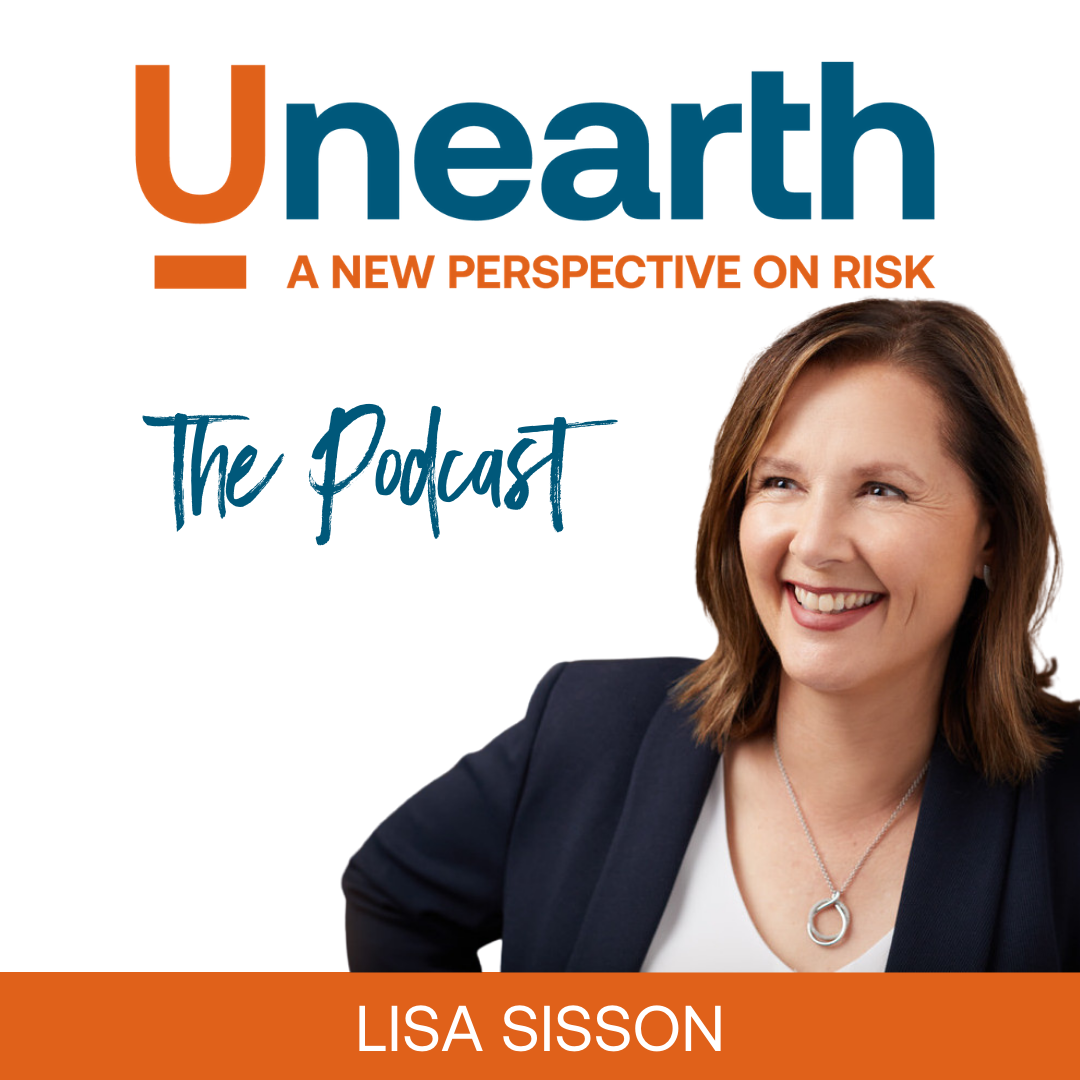
1.4K
Downloads
36
Episodes
As the title suggests, this podcast is all about unearthing a new perspective on risk. My guests are experts in their fields where they impact risk either directly or indirectly. My interviews aim to lift the lid on risk and rip it apart to give you a whole new perspective on it. My name’s Lisa Sisson and I am founder of risk consultancy, Unearth. I’m also becoming known somewhat as a “Risk Rebel”. At Unearth we believe that risk starts and ends with people. Equally, we believe that opportunity starts and ends with people. So if you’re not looking at risk with, through and by your people, then you are not only leaving your organisation exposed to risk, you are also not opening up the opportunities that a people-centred risk strategy will deliver.
As the title suggests, this podcast is all about unearthing a new perspective on risk. My guests are experts in their fields where they impact risk either directly or indirectly. My interviews aim to lift the lid on risk and rip it apart to give you a whole new perspective on it. My name’s Lisa Sisson and I am founder of risk consultancy, Unearth. I’m also becoming known somewhat as a “Risk Rebel”. At Unearth we believe that risk starts and ends with people. Equally, we believe that opportunity starts and ends with people. So if you’re not looking at risk with, through and by your people, then you are not only leaving your organisation exposed to risk, you are also not opening up the opportunities that a people-centred risk strategy will deliver.
Episodes
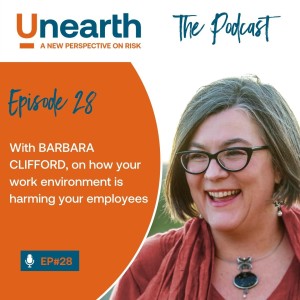
Monday Aug 22, 2022
Monday Aug 22, 2022
I have spoken often about how disengagement is one of the biggest and understated risks to an organisation. Many executives’ associate disengagement with productivity and don’t consider the risk exposure. When employees are disengaged, they are at best satisfied with the bare minimum level of productivity and focus. Which is why statistic shared from Gallup’s recent State of the Global Workplace: 2022 Report, that 83% of workers in Australia are not engaged or are actively disengaged, is incredibly concerning. This is an increase from 80% in 2021. So, disengagement continues to be one of our greatest risks today, though it is not being addressed as the risk it needs to be.
So, to help me discuss disengagement and how so many workplace environments are harming their people, I am excited to have Barbara Clifford, the co-founder of The Hinwood Institute join me. This is a topic both Barbara and I are both passionate about.
At The Hinwood Institute, Barbara is the lead trainer and coach in Time Management, and she is a recognised leader in Stress Management. She is a highly experienced coach, speaker, columnist, facilitator, and accredited mediator.
Barbara works closely with busy business leaders to support and equip them with tools to make courageous decisions in pressure situations for the long-term benefit of their business, team, and their own personal wellbeing. Giving them a sense of order; taking them from Chaos to Calm and transforming their stress into a source of strength.
Within this episode, Barbara and I have a candid discussion on importance of addressing dysfunctional and toxic work environment and the growing risk associated to disengagement, which is a quiet and understated risk within Australian businesses and governments today.
Some of the points we touched on include:
- Stressed employees who are working from home, challenged by pressure and expectations.
- Why productivity dropped with working from home, even when employees were working hard… bust some those myths around performance.
- Setting employees up for failure in terms of the infrastructure or support, or tools or resources that are there to deliver.
- When incompetency is not as it seems, employees unfairly being left in the cold.
- The importance of feeling appreciated.
- Adopting a position of curiosity, not judgement.
- The balance between efficiency and effectiveness.
- Understanding if there is really a time management issue, or actually a lack of understanding by the business management.
- The need for managers to be able to adapt and flex styles to the needs of the environment… through COVID, and now as we enter this new phase of returning to the office.
- Not devaluing mistakes or errors.
If you are ready to look at disengagement through a different lens, then reach out to the Unearth Team (unearth.com.au). Addressing disengagement is one of the biggest opportunities for business and government today, so don’t miss this opportunity or the rewards.
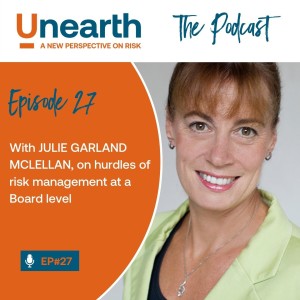
Monday Aug 08, 2022
Monday Aug 08, 2022
Have you ever wondered what it must be like to be a member of a Board, having accountability for a business entity but without the day-to-day management, influence, and control?
In this episode, I am joined by Julie Garland McLellan, who is a CEO, advisor to Boards and Directors, and the author of the ‘The Director Dilemma’ newsletter which is read in 33 countries.
Julie and I talk on some of the hurdles that so many Board members face in relation to risk management. So, this is a conversation you definitely don’t want to miss.
Julie has a fascinating background, as she is one of very few women to have commenced a board career with a single not-for-profit organisation and built it to a portfolio of boards including chairing an ASX listed company. Julie has chaired boards and committees and is respected for her practical experience.
Julie is a frequent speaker at conferences and is also a prized reference for journalists and has featured in ABC News’ Nightly Business Report, The Business Programme, The Australian Financial Review, The Financial Times (Britain), Company Director Journal, Keeping Good Companies, and other quality publications.
With more than 20 years’ experience delivering education programs for the Australian Institute of Company Directors, Julie has written more than 14 courses for that institute. She has also developed and delivered director education for the National Association of Corporate Directors (NACD), Director Institute, Governance Institute of Australia, College of Laws, University of Sydney, CPA Australia, The Taiwan Corporate Governance Association, The Oman Centre for Corporate Governance and Sustainability, and Better Boards Ltd.
In addition to her work developing director education Julie has continued to research and study directorship and most recently completed a course at Wharton Business School at the University of Pennsylvania. Julie is the author of several reference books for company directors including two that have been translated into Mandarin and are the global best sellers in their topic category.
Importantly, Julie is a qualified board reviewer and has conducted numerous reviews of boards, committees, and individual chairs and directors over the past 17 years. She has also won numerous awards including (twice) the Australian Institute of Company Directors Faculty award for contribution and excellence in governance education, the CPA President’s Award for Service and Excellence in Governance, The I E Business School Epic Award for Women Inspiring Women, and the Australian Business Award for Specialised Services in Board Advisory and Governance.
So, with all our collected experience, it was an opportunity for Julie and myself to have a candid discussion around risk and opportunity at a Board and Senior Executive level. Some of the points we covered include:
- Delegation of risk management
- The dangers of a ‘tick box’ approach to risk management
- When best intentions impede the abilities of your people
- Importance of a close relationship between Board and CEO
- The elephant in the room - Disengagement is not only about performance… it is about risk management
- Evidence of absence verses absence of evidence
- Board setting priorities to help with direction and motivation
- The need to separate development and performance discussions
- Importance of cross-training and internal training to support skills shortage, including examples of Australian Brands doing this well and not doing this well
If you have any questions, you would like Julie and I to discuss in our next discussion, then reach out and let us know what they are. You can find out more about Unearth and our contact details at unearth.com.au
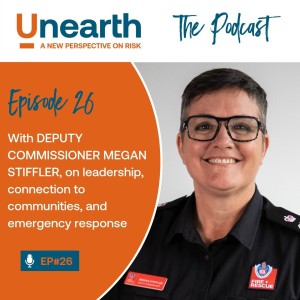
Thursday Jul 07, 2022
Thursday Jul 07, 2022
Those of you who know my story, know that my personal and business purpose are the same, ‘to create a safer world: one community and one workplace at a time’. It drives everything we do at Unearth.
At the end of the day, we all belong to a community. That is where we go home, to the people, our families, and things that mean the most to us. And right now, there are many communities in Australia that have been doing it tough, especially with the recent heartbreaking flood disasters.
It is in times like this we need strong and courageous leadership, which is why I am humbled to have Deputy Commission Megan Stiffler join me on this episode of my podcast.
For those of you who are not familiar with Megan (which she preferred me to call her), she joined Fire and Rescue NSW (FRNSW) around six months ago leading the Strategic Capability Division, which is responsible for developing and managing operational capabilities across the State.
The Division assists in setting FRNSW’s strategic direction and leads the development and delivery of emergency management specialised services, capability development, operational communications, and training.
Megan’s story is unique, and she shares how her journey started off within the corporate sector, with experience in marketing, insurance, and sales, then around 18 years ago a disaster event changed her life. Megan became motivated to start her career as a firefighter, then to a senior officer, to today as Deputy Commissioner.
Megan’s extensive operational background includes leading Urban Search and Rescue (USAR) teams on deployment and senior command experience across a multitude of large-scale operational events.
The diversity of Megan’s experience means her work in emergency services is complemented by senior executive experience in strategic change management and community engagement. In her executive resume, she holds an MBA and is a graduate of the Australian Institute of Company Directors.
It is worth noting that Megan’s leadership was recognised as a Queensland Finalist in the 2020 Telstra Business Women’s Awards.
In this episode I speak with Megan about her own story, her experiences within emergency services and the heartfelt stories of working with communities. This is an episode you really don’t want to miss. We talk on:
- How risk and risk management touches every aspect business, communities, and life.
- How people, emergency services personnel and volunteers, are willing to put themselves in harm’s way. Though Megan shares how they are calculated risks.
- Fire + Rescue learning as they move beyond just response and into recovery, that their response actions can have significant influence on the recovery piece.
- Megan’s experiences and stories about how some of the response decisions, even with the best of intentions to reduce the risk to communities, saw some decisions mean a missed opportunity to reduce one trauma becoming multiple traumas. Hear how Megan used one valuable lesson to help her identify and become more aware of an opportunity in another event, with a remarkable outcome.
- Some of the stories and examples shared were from the fires in Victoria, the recent floods NSW, including Lismore and Cabbage Tree Island, plus others.
- The exhilarating of seeing organic communities come together in a response to a disaster event.
- Megan’s thoughts on the future of Fire and Rescue for NSW, looking at 5, 10, 15 years’ time. What does the firefighter look like in the future? Looking at technologies, fuels, and many other areas, knowing the planning and implementing takes time.
- A passionate topic of my own, collaboration, and Megan shares her views on the potential for government departments to work closer and maximise investment and resources, plus jointly tackle large challenges.
There is so much value and wonderful stories within this episode. So invest the time to listen in.
There were a couple of areas that stood out for me.
- Megan’s ability to demonstrate courageous leadership and be vulnerable. Her commitment to lead by example and work to improve engagement, connection, and response for both responders and with communities.
- In all my conversations to date with Megan, it reaffirms Unearth’s work and approach to ‘putting recovery first’ and ‘planning under blue skies’ being so incredibly vital.
So, reach out if you would like to see how we could potentially help, or if your community passes the PUBS test?
You can listen to this podcast episode, but if you would like to see the video of our discussion, you can find it on YouTube, which I highly recommend and take the opportunity to get to know Megan better. I hope you join us.
Feel free to learn more about us at unearth.com.au
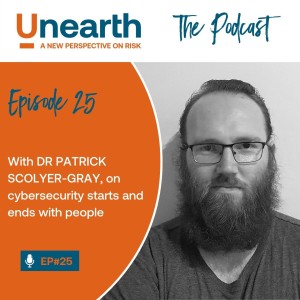
Monday Jun 27, 2022
Monday Jun 27, 2022
Since releasing my book last year, ‘Risk Starts And Ends With People’ and launching this podcast, ‘Unearth A New Perspective On Risk’, I have heard from so many of you how much our approach, our System4Risk (S4R), and stories have resonated, not to mention those lightbulb moments you have experienced.
So, I find it interesting that as soon as the discussion often leads towards technology and cyber, suddenly it is viewed differently. It is almost like the people within technology and cyber are viewed and treated differently from the rest of the business.
I find this fascinating, especially as I have shared the importance of people in all aspects of the business and highlighted the risks being felt by our cybersecurity teams. Technology may be the tool of trade, but it is still people who are the users of the technology, and there are many risks, including fatigue. Your cybersecurity teams are in a battlefield that never sleeps, 24/7, every day of the year. I have spoken on a couple of panel discussion the topic of fatigue and other challenges and risk within cybersecurity. Which is an ongoing concern, especially with the supply-chain (skilled cybersecurity resources) shortage, meaning that many of these team members are stretched beyond their capacity, opening themselves and the business to a range of risks.
So, in this episode we are going to discuss the topic of cybersecurity and joining me is Dr Patrick Scolyer-Gray, who champions the Human-Centric Cybersecurity (HCCS) offering for 460degrees. As a cyber-sociologist, Patrick investigates how and why people think and do what they do. Drawing from a range of concepts and methods in behavioural and physical sciences, Patrick identifies security implications of human behaviour and develops solutions to the vulnerabilities he finds. Leveraging a broad range of experiences as an academic and engagements with industry and government, particularly the Australian Department of Defence.
Forewarned, this is a topic Patrick and I are both passionate about as we share why ‘cyber starts and ends with people’. Through our discussion we touch on:
- Patrick’s own story, which began in academia, as he was originally a lecturer and then a research fellow and his PhD in Sociology. How his journey ironically, he found his way into cybersecurity. How Patrick turned up as the only social scientist in the physical sciences side of the university, leading to people asking, ‘Are you in the wrong building?’
- What is cyber sociology?
- Importance of recalibrating perspectives away from a technological focus to looking at humans.
- Challenging Patrick’s statement that ‘somewhere between depending on whose figures you look at between 90 and 95% of all cyber incidents, bad cyber things that happen are attributable to human failure of some kind.’
- Bringing technology and humans together as a unified whole.
- The limited time that people have to learn and master technology, as it enters the market at such a pace.
- 3 Pillars Patrick focuses on for human-centred cyber security:
- Cyber indifference
- Cyber literacy
- Security culture
- Cybersecurity cannot be a one brush approach.
- Understanding the motivation of our people.
There plenty to sink your teeth into, and to challenge your thinking. Or perhaps you might like to challenge ours.
We would love to hear your thoughts on the episode, so please feel free to reach out to me directly through Contact Us - Unearth. And remember, whether it is risk or cyber, it starts and ends with your people.
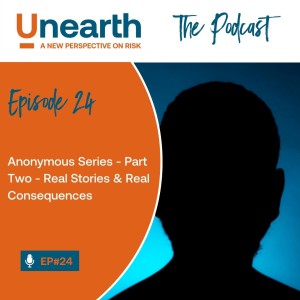
Monday Jun 13, 2022
Monday Jun 13, 2022
The Anonymous Series are real stories and real consequences, shared directly from the person.
During our last episode (episode 23) we introduced you to Anon, our first anonymous guest in our ‘Anonymous Series’, who has bravely shared their experience, their story as a senior executive within technology of a large Australian organisation and how the behaviour, decisions, and actions of a few had consequences on a whole team.
If you have not yet listened to episode 23 then we recommend doing so first. Anon’s experience is an eye opener, though so many aspects of their story are all far too common.
In this episode we have the opportunity to hear from our guest panel and myself, on our insights and thoughts of Anon’s experience, looking at both sides of the coin, risk and opportunity.
Our guest panel comprises of Carolyn Butler-Madden, author, speaker, Founder and “Chief Purpose Activist” at her Purpose Consultancy, The Cause Effect. Carolyn helps business leaders define their Purpose and embed it into their business and brand to deliver meaningful social impact and competitive advantage.
And Dr Mark Crosweller AFSM, the Founder and Director of Ethical Intelligence, where Mark works with organisations and leaders to inspire their confidence and their competence in aspects of ethics which are inherently existent in their people.
The experience Anon shared, highlights a number of challenges, risks, missed opportunities, and the importance of people, at all levels of the business. It is never a good sign to hear of an executive showing leadership through fear verses leadership through a shared vision. It is even more concerning when employees (including executives) raise concerns, only to find what appears to be deaf ears and a CEO only hearing what they wanted to hear.
What compounded Anon's experience was the internal processes for raising issues and concerns of poor behaviour failed, so executives and employees could not raise legitimate concerns and their only option appeared to be the ‘Whistle-blower’ line to raise their concerns for Board's visibility and then ability to investigate.
The thoughts and insights from my guest panel, Carolyn and Mark, are filled with incredibly valuable points and perspectives, which we have only captured just a handful, including:
- A central theme being ‘trust’.
- In what appeared to be a lack of trust by the CEO of Anon in their judgement and concerns relating to the appointment of the new Program Director; and
- The senior executives were aware and understood how the tech team felt about the person being appointed to this new Program Director role, and rather than trying to understand why, or see if there was any validity in the concerns, they were ignored by the CEO and other senior executives and pushed ahead, so they broke the trust of the tech team.
- How some people, including executives, tell themselves stories to justify their decisions, regardless that the evidence may contradict those decisions.
- Culture, one that disavows, denies, or ignores its vulnerability.
- A simple way to look at vulnerability is it wants to get rid of any sense of risk, or anything that looks ugly or doesn't sound good, so let’s ignore it. Yet, vulnerability is part of being human because it establishes the basis of relationality and trust.
- Selection criteria of a senior role appointment, how deep do organisations go to understand their candidates, their virtues, or their capacity to be more compassionate or to be more empathetic, or to be an active listener. Or their ability to be courageous or what it means to be truly trustworthy.
- Or, are these attributes even important for the organisation to encourage within its culture?
- Fear and compliance being drivers within organisational cultures.
- The need for a ‘safe zone’ so your people’s voices can be heard, allowing difficult and brave conversations to be tabled, encouraging concerns relating to risks, personal concerns and even opportunity can be shared, heard, and acknowledged, even actioned.
- How disengagement can lead to insider threat.
All this in just the first 15 minutes. Wait until you hear the rest. Invest the 30 minutes and check out this episode, you won’t be disappointed.
If you have found value in the first two Anonymous episodes, then let me know what stood out for you. Or if you have been through an experience that others can learn from and would like to be part of an Anonymous series, then please feel free to contact me directly though Contact Us - Unearth
We will share another two part series with another anonymous person's story in the not too distant future, so keep an eye out.
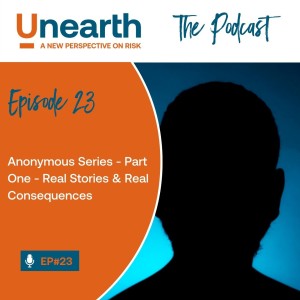
Tuesday May 31, 2022
Episode 23: Anonymous Series – Part One – Real Stories & Real Consequences
Tuesday May 31, 2022
Tuesday May 31, 2022
The Anonymous Series are real stories and real consequences, shared directly from the person.
Meet Anon, our first anonymous guest in our ‘Anonymous Series’, who is bravely sharing their experience, their story as a senior executive within technology of a large Australian organisation and how the behaviour, decisions, and actions of a few had consequences on a whole team.
Anon is an experienced technology executive that was attracted to this particular role for the organisation to address their challenges in terms of how the technology function performed, how it engaged with the rest of the organisation, and how well prepared the technology function was to support major transformational activities within the organisation.
Anon’s experience is an eye opener, though so many aspects of their story are all far too common.
No, this is not a finger-pointing exercise. The purpose of the anonymous series is to share real stories directly from the person, while protecting the anonymous guest and the other people and the organisation within the story by only sharing the experiences to learn from.
And to help with those learning opportunities, we have a guest panel, who listened to the events that have been shared by Anon, and who asked questions of Anon in this episode. Then in our next episode (episode 24, which will be part two), you will hear from our guest panel on their insights and thoughts of Anon’s experience, looking at both sides of the coin, risk and opportunity.
Our guest panel comprises of Carolyn Butler-Madden, author, speaker, Founder and “Chief Purpose Activist” at her Purpose Consultancy, The Cause Effect. Carolyn helps business leaders define their Purpose and embed it into their business and brand to deliver meaningful social impact and competitive advantage.
And Dr Mark Crosweller AFSM, the Founder and Director of Ethical Intelligence, where Mark works with organisations and leaders to inspire their confidence and their competence in aspects of ethics which are inherently existent in their people.
- The experience Anon shares, highlights a number of challenges, risks, missed opportunities, and the importance of people, at all levels of the business. Some of the points highlighted were:
Senior executive’s hearing what they wanted to hear. - Are you setting people up for success when moving them into roles where they have demonstrated they a lack of skills?
- Perceived questionable decisions by senior executives on promotions and the implications and consequences of the decision on the many.
- Who is listening, when human risks are raised to the most senior levels within the organisation on concerns of relating to decisions?
- When internal processes fail to allow executives and employees to raise legitimate concerns and only option is the ‘Whistle-blower’ line to raise concerns for Board visibility and investigation.
- Leadership through fear verses leadership through a shared vision.
- The difference in approach, creating a safe zone for people being able to perform, verses the reality of this story where employees became ill as a result of the stress.
What would you do if you found yourself in a human risk situation where you felt like no one listened or acknowledged your concerns?
Wait until you hear the thoughts and insights of our guest panellists in the next episode, so make sure you tune in, it is not one you want to miss.
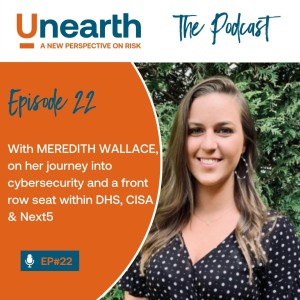
Sunday May 15, 2022
Sunday May 15, 2022
At the beginning of this year, I had the privilege of speaking with Meredith Wallace from Next5 on her incredible journey (so far, as she is still in her twenties), including how she overcame challenges and adversities to achieve her dream of serving her country.
Meredith grew up in Virginia Beach in the US, which is surrounded by US Military Bases. Early in Meredith’s life she witnessed the comradery and strength of females who were serving, which inspired Meredith to want to attend the United States Navy Academy. But how Meredith thought her future may play out, hit a major obstacle when she became ill.
With courage and tenacity, Meredith, stayed focused on her dream and turned every stone, until she was able to find a path that allowed her to meet her goal of serving her country. Her journey took her to the Middle East working with the ‘Five Eyes’ (intelligence alliance between the US, UK, Canada, Australia, and New Zealand), including having the opportunity to work with Australian’s, which Meredith loved.
Soon after, Meredith found herself in the US Department of Homeland Security (DHS), where she met her current boss, Bryan Ware, who has also been on our Podcast (Bryan is the CEO of Next5). Meredith followed Bryan, as his senior advisor, when he was appointed to lead the cybersecurity mission in the newly created Cybersecurity & Infrastructure Security Agency (CISA).
Through Meredith’s journey within DHS and CISA, she had a front row seat to many events and incidents, which we talk about, and many other topics including:
- Russia, Iran, and China trying to influence the US presidential election
- The impact of COVID and what it was like to be only one of a few in the office, plus the health toll it took
- The opportunity to witness what effective leadership and communication during a potential crisis can look like
- TikTok and our lack of awareness of what we are giving away
- Geopolitical risks and how our use of technology can unknowingly expose us
- US Governments response to the SolarWinds incident
- Microsoft Windows 10 flaws right before they released Windows 10
- Why Meredith moved across to the private sector and the importance of strong leadership, that drew her to Next5
This is an episode everyone will want to listen into, as it has something for everyone. Not to mention, with Australia’s own election fast approaching, it gives us some things to keep in mind, especially with tensions increasing between Australia and China.
So, tune in, it is a fascinating discussion.
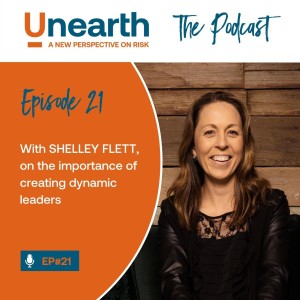
Monday May 02, 2022
Episode 21: With Shelley Flett on the importance of creating dynamic leaders
Monday May 02, 2022
Monday May 02, 2022
A couple of weeks ago I held a ‘Courageous Leadership’ event, which received incredible feedback. Society is calling for leadership. But calling is one thing, how do we support people to find the courage to step forward and feel supported as they develop the necessary skills to lead effectively, and have find the confidence so they can show up as themselves?
We need to provide them with a ‘safe zone’ and the resources, support, time, and opportunities they need to embark on their journey. This is why today’s episode of my podcast is so timely.
A little context for you. Last year I had the pleasure to speak with Shelley Flett on her podcast, ‘The Dynamic Leader’. Shelley and I found common ground in our thinking and philosophy. I appreciate the amazing work Shelley has been doing as a leadership development and team performance coach and facilitator. She has had over 15 years’ experience leading and coaching individuals across a broad range of industries.
So, I decided to ask Shelley to join me on my podcast so we could tap into the work she is doing and talk about both the opportunities and risks we are seeing with people management and leadership.
I will also share, the recording of this episode with Shelley was done prior to the ‘Courageous Leadership’ event I held but this episode complements the event so well.
Shelley is passionate about increasing capability and reducing dependency and encourages transformational (over transactional) change. She is also the author of two books:
- ‘The Direction Dilemma’ - why knowing what you want makes you a better leader.
- ‘The Dynamic Leader’ - become the leader others are inspired to follow.
We covered a lot in our discussion on being an effective leader and the risks in not having effective leadership within an organisation. This episode is a treasure trove of insights to help any person at all levels of their leadership path, including:
- The relevance and importance of our journey’s to be where we are today.
- How we can become institutionalised as we can get lost and emerge into the fabric of the organisation in which we work within.
- Our search to understand, ‘Who am I? What is my identity? What is that made up of?’ And understand ‘Who I am, is not what I do. And what I do, is not who I am.’
- Giving feedback and both the opportunity and risk associated to how you do this, including feedback that is personal and offensive is not okay.
- The importance of creating a safe space for ourselves and knowing how to have boundaries. Drawing on Elizabeth Lesser’s quote, ‘Do no harm take no sh!t’.
- The importance of coaching and understanding that coaching is not show and tell, it is ask and listen.
- Treating employees like adults and move away from ‘tell mode’.
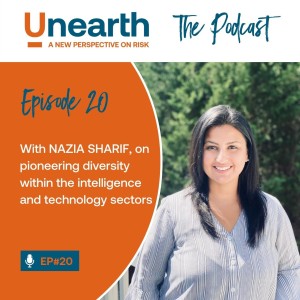
Tuesday Apr 19, 2022
Tuesday Apr 19, 2022
Diversity is a topic that comes up regularly. The need for strong women to have the courage to step forward and help build a pathway for themselves, and others.
Well today, we are talking to a ‘trailblazer’, being a first-generation Pakistan American woman who had the ambition and focus to join the FBI, yet it would seem life had other plans. Meet Nazia Sharif and hear about her remarkable experiences as an FBI Intern and how life opened up a new direction and world of possibilities and opportunities, within the private sector.
Today, Nazia Sharif is the Chief Operations Officer at Next5 Inc, a business intelligence and strategic advisory firm focused on emerging technology and geopolitics.
Nazia holds a Bachelor of Science (B.S.) in Political Science and Criminal Justice, speaks four languages, as well as a Master of Arts (M.A.) in Criminal Justice and Sociology and prior to her time at Next5, Nazia served multiple roles at Haystax.
Haystax provides patented AI-backed software to assist the public and private sector in risk management ranging from detecting insider threats to planning law enforcement operations. During her time at Haystax, Nazia was an analyst focused on insider threat and continuous evaluation; she helped develop a pandemic response solution; was the project manager to multiple customers; managed the company’s facility clearance and was promoted to Chief of Staff to the CEO.
So, join us as we discuss Nazia’s remarkable and inspiring story, including:
- Serving in the FBI for a year working in Counterintelligence and the Field Intelligence Group.
- Growing up as a first generations Pakistan American.
- How September 11 changed Nazia’s perspective and drive to be in the middle of the change needed.
- How one person’s leadership changed her life.
- The joy and challenges of being a high performer and parent to twin-boys.
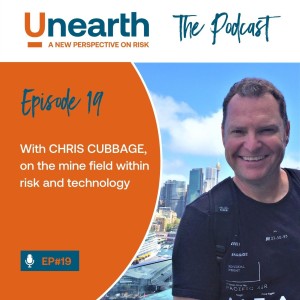
Sunday Apr 03, 2022
Episode 19: With Chris Cubbage, on the mine field within risk and technology
Sunday Apr 03, 2022
Sunday Apr 03, 2022
Last year I had the pleasure of being interviewed by Chris Cubbage on his show, MySec.TV. It was such an interesting discussion I reciprocated the offer for Chris to share his own incredible story on this episode.
Today, Chris is Director and Executive Editor for MySecurity Media and principal consultant with Amlec House. Chris is the author of Corporate Security in the Asia Pacific Region, Security Risk Management in Corporate Governance and publisher of Cyber Risk Leaders by Shamane Tan. As I mentioned prior, Chris is the host of MySec.TV, plus the Cyber Security Weekly Podcast and editor of the Australian Cyber Security Magazine and Cyber Risk Leaders Magazine. So, a very busy person, having many interesting conversations with local and international guests.
Though on this episode, Chris takes us back 30 or so years to share where his fascination with technology was ignited, within his time in the WA Police Force. Chris had a remarkable 15 years in policing, including as a Homicide Detective and Australian Crime Commission Senior Investigator. So listen in as Chris shares the chapters in his life, including:
- Chris's sliding door moment.
- How the Claremont serial killings was defining in Chris’s life.
- His concerns on leadership, especially government and global leadership… where is Australia going?
- How executives are facing with fatigue, disengagement and cultural challenges.
- And of course, a little technology.
